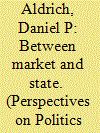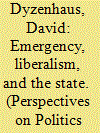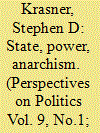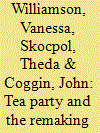|
|
|
Sort Order |
|
|
|
Items / Page
|
|
|
|
|
|
|
| Srl | Item |
| 1 |
ID:
105369


|
|
|
|
|
| Publication |
2011.
|
| Summary/Abstract |
Developed and developing nations alike face low-probability but high-consequence exogenous shocks, including ice storms, chemical spills, terrorist attacks, and regional blackouts. Recently, "natural" disasters have dominated the airwaves; mega-catastrophes that claim more than 1,000 lives have become an almost yearly occurrence. In 2010, the Haiti and Chile earthquakes killed more than 200,000 people between them and felt all too familiar to many observers in the West. Before them were Cyclone Nargis in Burma, which took 130,000 lives in 2008; Hurricane Katrina, which killed more than 1,500 New Orleans residents and left 80% of the city flooded in 2005; and the Indian Ocean tsunami, which claimed roughly a quarter of a million lives in India, Indonesia, Sri Lanka, and Thailand in 2004.
|
|
|
|
|
|
|
|
|
|
|
|
|
|
|
|
| 2 |
ID:
105371


|
|
|
|
|
| Publication |
2011.
|
| Summary/Abstract |
In the wake of 9/11, many political scientists and theorists in the United States of America turned their attention to the topic of emergencies. That required them to confront a fundamental question: Are emergencies to be studied as important in their own right, as altogether exceptional events that threaten the very existence of a society in unforeseeable ways? Or are they important, not because they are radically distinct from the normal situation of politics, but because they bring to the surface otherwise implicit aspects of normal politics?
|
|
|
|
|
|
|
|
|
|
|
|
|
|
|
|
| 3 |
ID:
105363


|
|
|
|
|
| Publication |
2011.
|
| Summary/Abstract |
There is no integrated regime governing efforts to limit the extent of climate change. Instead, there is a regime complex: a loosely-coupled set of specific regimes. We describe the regime complex for climate change and seek to explain it, using interest-based, functional, and organizational arguments. This institutional form is likely to persist; efforts to build a comprehensive regime are unlikely to succeed, but experiments abound with narrower institutions focused on particular aspects of the climate change problem. Building on this analysis, we argue that a climate change regime complex, if it meets specified criteria, has advantages over any politically feasible comprehensive regime. Adaptability and flexibility are particularly important in a setting-such as climate change policy-in which the most demanding international commitments are interdependent yet governments vary widely in their interest and ability to implement them. Yet in view of the serious political constraints, both domestic and international, there is little reason for optimism that the climate regime complex that is emerging will lead to reductions in emissions rapid enough to meet widely discussed goals, such as stopping global warming at two degrees above pre-industrial levels.
|
|
|
|
|
|
|
|
|
|
|
|
|
|
|
|
| 4 |
ID:
105366


|
|
|
|
|
| Publication |
2011.
|
| Summary/Abstract |
Member-based civic associations, or citizen groups, have two crucial roles in American democracy. They advocate for members' interests in the public arena, but also operate as Tocquevillian "schools of democracy" linking citizens to politics and equipping them with the skills of democratic citizenship. Yet scant research has examined the interrelationships of these two roles. Does the work that civic associations do in developing democratic participants enhance the work they do advocating for members' interests in the public arena? We bring together two previously disparate strands of research on civic associations by arguing that a key factor affecting the political presence of civic associations is leadership quality. We focus on the relationship of leadership quality to political presence, using data from a unique 2003 study of 226 local entities of the Sierra Club. We show that organizations with more skilled and committed leaders have higher levels of political presence. This contrasts with previous research that has focused primarily on community context and resources as explanatory factors. This study shows that political presence is related to the extent to which leaders develop their skills and demonstrate commitment to the organization.
|
|
|
|
|
|
|
|
|
|
|
|
|
|
|
|
| 5 |
ID:
105373


|
|
|
|
|
| Publication |
2011.
|
| Summary/Abstract |
The book under discussion is James C. Scott's latest contribution to the study of agrarian politics, culture, and society, and to the ways that marginalized communities evade or resist projects of state authority. The book offers a synoptic history of Upland Southeast Asia, a 2.5 million-kilometer region of hill country spanning Vietnam, Cambodia, Laos, Thailand, Burma, and China. It offers a kind of "area study." It also builds on Scott's earlier work on "hidden transcripts" of subaltern groups and on "seeing like a state." The book raises many important theoretical questions about research methods and social inquiry, the relationship between political science and anthropology, the nature of states, and of modernity more generally. The book is also deeply relevant to problems of "state-building" and "failed states" in places like Afghanistan, Iraq, and Somalia. As Scott writes, "The huge literature on state-making, contemporary and historic, pays virtually no attention to its obverse: the history of deliberate and reactive statelessness. This is the history of those who got away, and state-making cannot be understood apart from it. This is also what makes it an anarchist history" (p. x).
In this symposium, I have invited a number of prominent political and social scientists to comment on the book, its historical narrative, and its broader theoretical implications for thinking about power, state failure, state-building, and foreign policy. How does the book shed light on the limits of states and the modes of resistance to state authority? Are there limits, theoretical and normative, to this "anarchist" understanding of governance and the "art of being governed"?
|
|
|
|
|
|
|
|
|
|
|
|
|
|
|
|
| 6 |
ID:
105364


|
|
|
|
|
| Publication |
2011.
|
| Summary/Abstract |
In the aftermath of a potentially demoralizing 2008 electoral defeat, when the Republican Party seemed widely discredited, the emergence of the Tea Party provided conservative activists with a new identity funded by Republican business elites and reinforced by a network of conservative media sources. Untethered from recent GOP baggage and policy specifics, the Tea Party energized disgruntled white middle-class conservatives and garnered widespread attention, despite stagnant or declining favorability ratings among the general public. As participant observation and interviews with Massachusetts activists reveal, Tea Partiers are not monolithically hostile toward government; they distinguish between programs perceived as going to hard-working contributors to US society like themselves and "handouts" perceived as going to unworthy or freeloading people. During 2010, Tea Party activism reshaped many GOP primaries and enhanced voter turnout, but achieved a mixed record in the November general election. Activism may well continue to influence dynamics in Congress and GOP presidential primaries. Even if the Tea Party eventually subsides, it has undercut Obama's presidency, revitalized conservatism, and pulled the national Republican Party toward the far right.
|
|
|
|
|
|
|
|
|
|
|
|
|
|
|
|
|
|
|
|
|